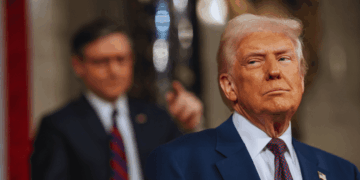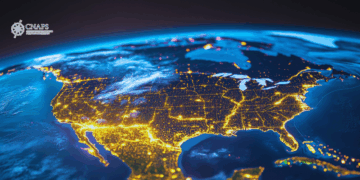This article was originally published by Real Clear World.
By Christian Leuprecht, March 5, 2024
Finally. After 25,000 Mexicans applied for asylum in Canada last year, thousands of attempts to illegally cross into the United States on the northeast border, and millions of dollars spent on security and aid, the Canadian government has decided to close the barn door (or fix its own mistake).
After pleas from the United States and Quebec’s premier, the Liberal government is reinstating visa requirements for Mexican citizens entering Canada. It reverses the government’s ill-informed highly political decision against the expert advice of its own civil service. More than a mea culpa, the decision repudiates the government’s professed “values-based” approach to public policy: policy should be based on national interest; values are merely the means by which interests are delivered.
Unlike the more tumultuous Mexican border, the United States and Canada have reaped enormous benefits from a common border that is bilaterally governed and efficiently administered. Joint agreements, premised on trust and reciprocity, oversee cross-border trade, environmental policy, law enforcement, intelligence sharing and military co-operation. These arrangements underpin one of the most open and prosperous borders in the world, helping to facilitate over US$2.5 billion in daily trade and making Canada the top U.S. export market.
But Canada is losing the plot. Blunders on transnational organized crime, migrant smuggling and human trafficking are putting this cross-border prosperity and security at risk.
Canada has become an enabler of the global illicit economy. Corruption is measurably on the rise. Up to $113 billion in illicit funds are being “snow-washed” through Canada annually. And as cartels displace their operation northward, Canada has become a top fentanyl exporter to Australia and Europe.
In 2016, against the advice of its own bureaucrats, the Liberals reversed a policy by the previous government that had imposed visa restrictions on Mexican nationals. Predictably, Mexico is now the top source country for asylum seekers in Canada: over 25,000 individuals lodged asylum claims in Canada in 2023, up from just 250 in 2016.
However, most Mexicans do not qualify as legitimate refugees: only a third of Mexican claims are accepted by Canada’s Immigration and Refugee Board, which is much lower than the average for other countries. But the adjudication of refugee claims doesn’t really matter because few unsuccessful claimants end up being deported.
Despite the Mexican government’s professed commitment to “orderly, humane, safe and regular migration,” migrants kept on coming in unprecedented numbers. Under Prime Minister Justin Trudeau’s watch, U.S. Border Patrol’s encounters with potential illegals along the northern border — especially in New York, Vermont and New Hampshire — were on track to exceed over 200,000 in 2024, an increase of about 50 per cent from 2022.
Pleas for change from the United States were bipartisan. The Biden administration urged Canada to reimpose visas. Republicans Donald Trump, Ron DeSantis and Nikki Haley all lamented the situation. Congress’s Northern Border Security Caucus has been vocal about the liability that Canada poses.
Sustained U.S. political attention and politicization is bound to accelerate the “Mexicanization” of the northern border, even as the militarization of the southern border has rewarded smugglers, coyotes, and cartels.
At $6,000 a head, migrant smuggling from Canada into the U.S. was already big cartel business. Many Latin Americans were transiting through Mexico from Venezuela and Colombia en route to Canada. Migrant smugglers have been furnishing them with counterfeit passports: the Canada Border Services Agency intercepted over 15,000 forged Mexican travel documents in 2023. Canadian cartel offshoots also exploit these illegal migrants for human trafficking and forced labour, as well as sexual exploitation and abuse.
This state of affairs, of northern complaisance and southern anxiety, came at great reputational risk to the bilateral trust that has made our border the envy of history and the world. Rolling back the 2016 decision to stop imposing visa restrictions on Mexican nationals signals that the Trudeau government is finally prepared to put the Canada-US relationship and continental security ahead of partisan politics.
It is in the best interests of both countries for Canada to act decisively on migrant smuggling, human trafficking and transnational organized crime. That Prime Minister Trudeau is finally starting to relent on politicizing visa policy for partisan self-interest significantly reduces Canada’s target surface during and after the U.S. presidential election.
Christian Leuprecht is a professor at Royal Military College and Queen’s University, senior fellow at the Center for North American Prosperity and Security (www.cnaps.org), and co-editor of Security. Cooperation. Governance. The Canada-United States Open Border Paradox.








